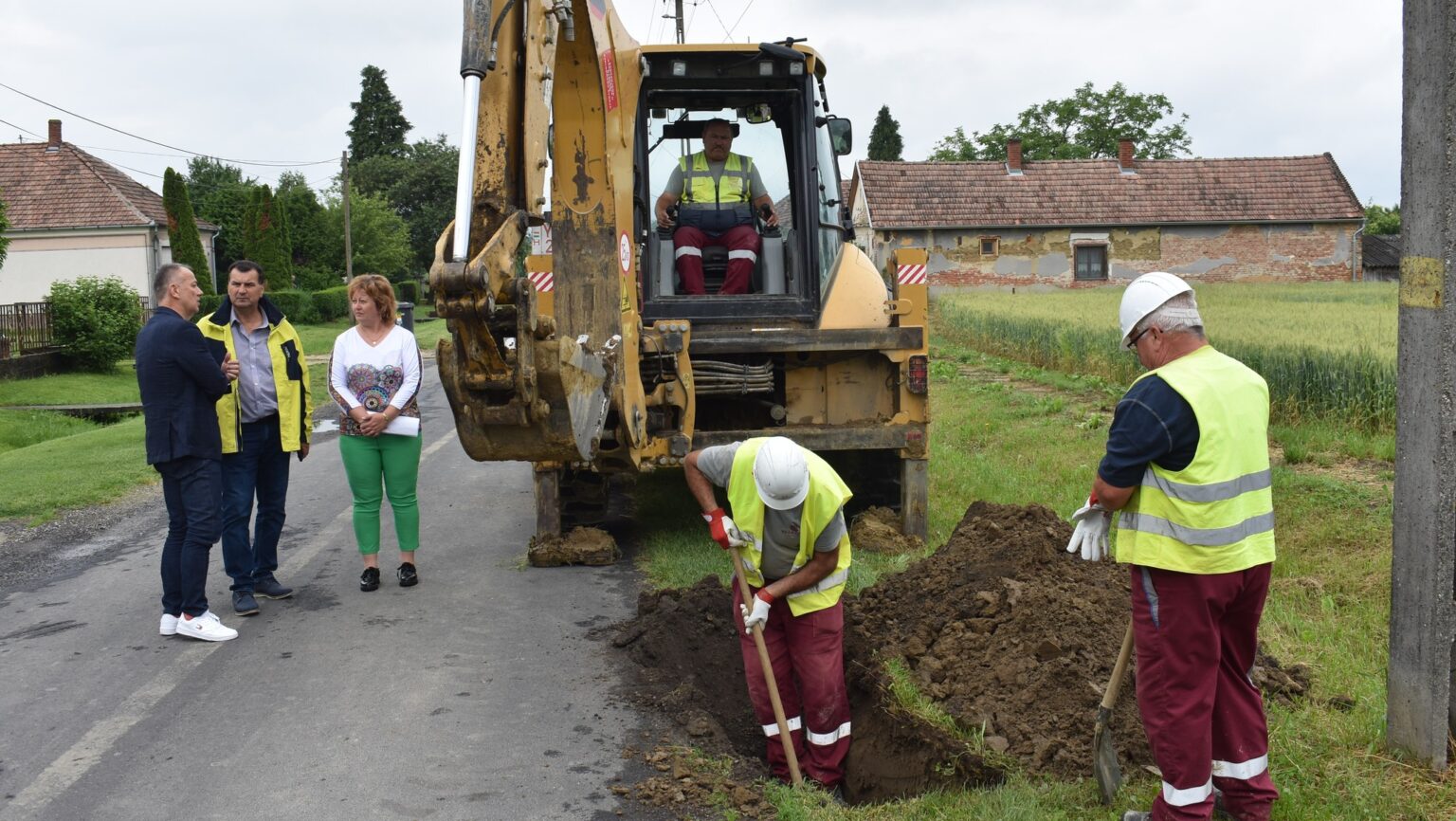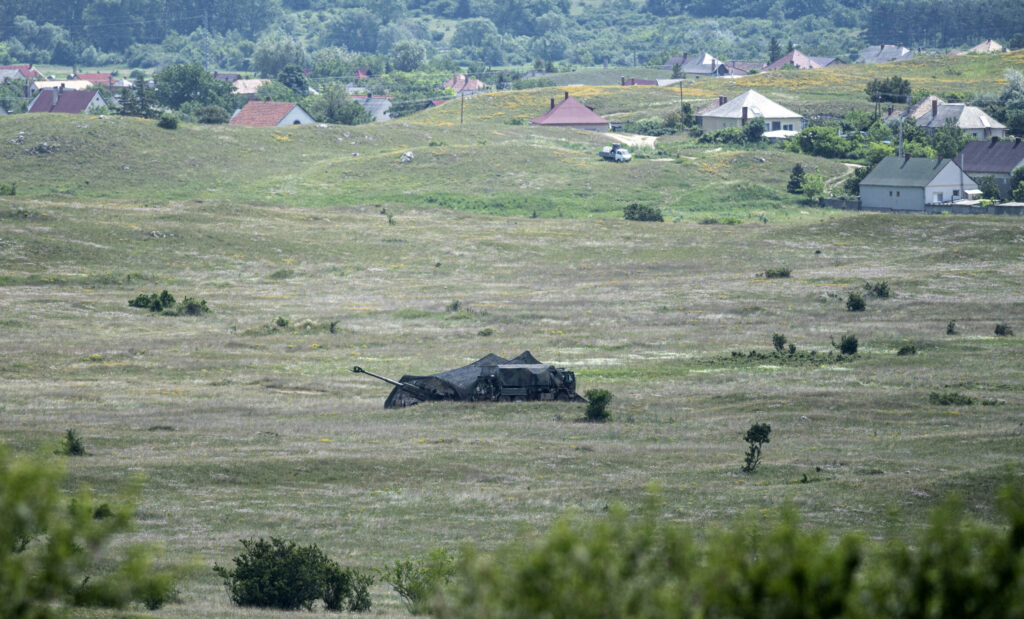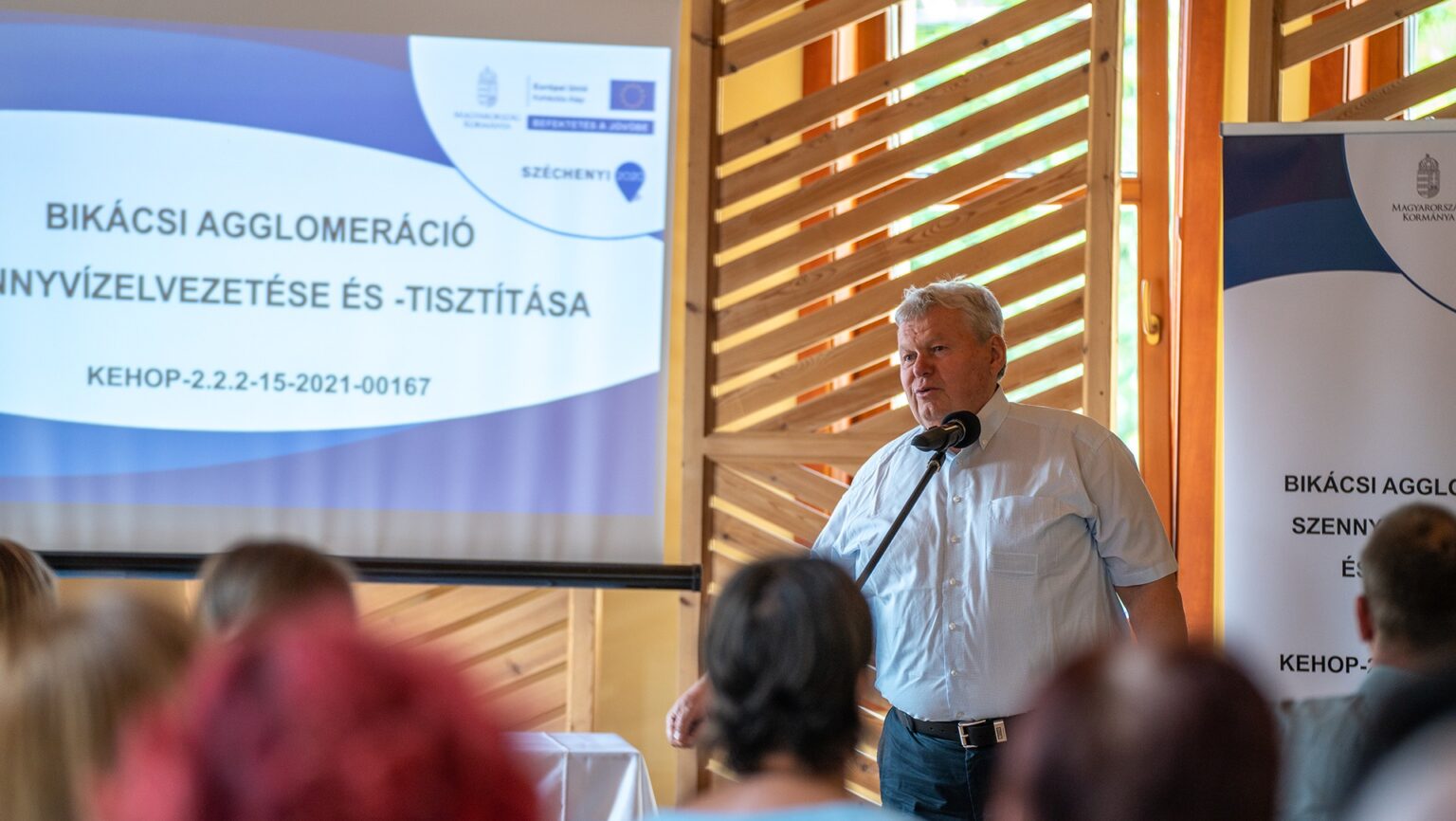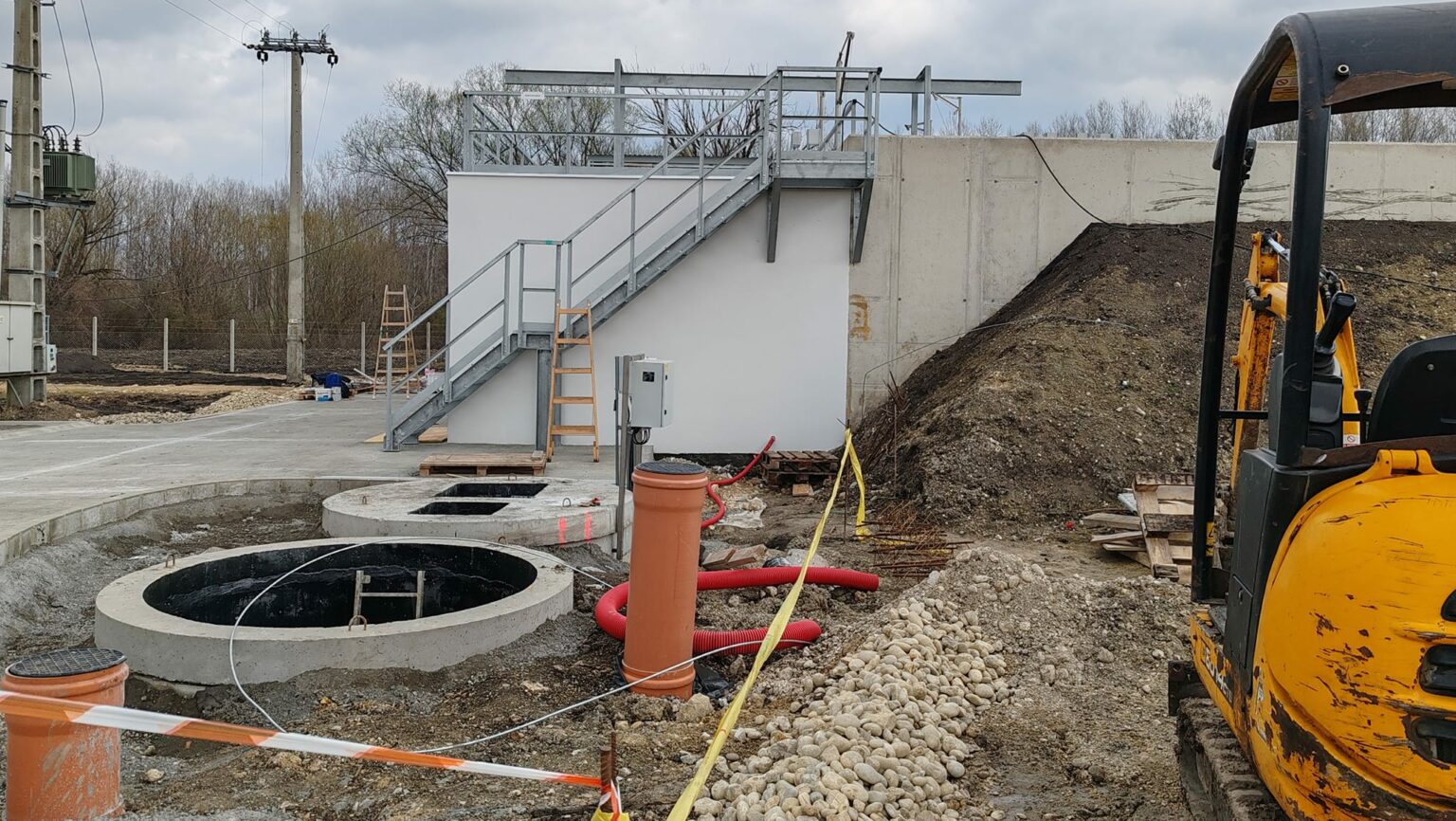The https://english.atlatszo.hu use cookies to track and profile customers such as action tags and pixel tracking on our website to assist our marketing. On our website we use technical, analytical, marketing and preference cookies. These are necessary for our site to work properly and to give us inforamation about how our site is used. See Cookies Policy
When in doubt, blame the war: even village sewers aren’t safe
It is not unusual for the companies of the richest man in Hungary, Lőrinc Mészáros, to face delays when completing publicly funded building projects, and to ask (and usually recieve) adittional funds. Recently, they found a new excuse for this practice: blaming price increases on the war in Ukraine.
In February 2022, Mészáros és Mészáros Zrt. agreed to construct and develop wastewater treatment systems in the Tolna County villages of Bikács and Regöly, as well as in Öskü and Pétfürdő in Veszprém County – all of this for a net total of 17 billion forints under the original contract. Since then, the company has twice submitted requests for price increases to the Ministry of Construction, citing, for whatever reason, the war in Ukraine as a driver behind rising costs.

The company is now being paid around an additional 1.6 billion forints (3,97 million EUR).
The same pattern was repeated in Baranya and Zala counties. In February 2022, a joint bid from A-Híd Zrt. and Szabadics Zrt. won the contract for wastewater collection and treatment in several municipalities with a net offer of 22.2 billion forints. But – due to “circumstances related to the Russian Ukrainian war” – János Lázár’s ministry is paying them nearly 1.5 billion forints more than the initial agreed-upon price.
In both cases, the EU is footing the bill.
In mid-July 2021, the National Development Program Office (NFP) issued a public procurement notice for the implementation of wastewater collection and treatment in the agglomeration of Bikács and Regöly in Tolna County, as well as for wastewater treatment in Öskü and Pétfürdő in Veszprém County.
The affected settlements across the two counties are: Bikács (396 inhabitants), Györköny (974), Öskü (2,150), Pálfa (1,441), Pétfürdő (4,301), Pusztahencse (892), Regöly (963), Szakály (1,203), Szárazd (213), and Vajta (784). The cost of the investments is being covered by European Union funds through the Environmental and Energy Efficiency Operational Programme (KEHOP).
In mid-June 2023, János Süli, the Fidesz MP for Tolna County’s 3rd electoral district—which includes Bikács, Györköny, Regöly, Szárazd, and Szakály—announced the start of the project.
An extra 1.5 billion for the Mészáros Company
The winning contract with Mészáros és Mészáros Zrt., owned by Lőrinc Mészáros, was signed on February 24, 2022 – significantly earlier than the announcement.
The National Development Program Office (NFP) originally estimated the project cost at net 16.1 billion forints, but among the three bidders, the Mészáros company submitted the lowest offer, taking on the job for a net 17.049 billion forints. Competing EuroAszfalt offered 17.9 billion, while Szabadics Zrt. quoted 18.7 billion forints.
On first glance then, the best bid won. Over time, however, the bid seems less like a good deal and more like a placeholder number – a fortuitous underestimate.
The Mészáros és Mészáros Zrt. offer has become significantly more expensive. The contract value first increased at the end of 2023, rising by 856.3 million forints to a total of 17.9 billion. According to a recently published amendment, the state approved another price increase of 726.7 million forints in fall 2024.
As a result, the total cost of the project has risen to a net 18.6 billion forints.
According to procurement documents, Mészáros és Mészáros Zrt. first informed the Ministry of Construction and Transportation (ÉKM)—which took over the project after the NFP was dissolved in early 2023—of a 1.9 billion-forint hike in 2023. After reviewing the situation, Minister János Lázár’s office confirmed an additional net cost of 2 billion forints. Of that, 321 million was considered a regular business risk, and half of the remaining 1.7 billion—specifically 856.3 million forints—was approved for payment to the Mészáros company.
Then, the next contract amendment clarified that this amount only covered costs incurred up to July 31, 2023. Before the technical handover of the construction was completed, on August 22, 2024, Mészáros és Mészáros Zrt. contacted the ministry. This time, they reported an additional net cost of 1.5 billion forints for the period between August 1, 2023, and September 3, 2024. The ministry determined that the actual increase was even higher – 1.8 billion – but subtracted 358 million as standard business risk, approving half of the remaining amount, which came out to a respectable 726.7 million forints.
Prices surge in Baranya and Zala counties
A similar situation unfolded in another region, involving many of the same players – proverbial repeat offenders.
In early July 2021, the then-operational National Development Program Office (NFP) issued a public procurement tender for the design and construction of wastewater collection in Kozármisleny, wastewater collection and treatment in the Bánokszentgyörgy agglomeration, wastewater collection and treatment in the Gelse-centered agglomeration, and wastewater collection in the villages of Surd and Liszó.
A total of 24 settlements in Baranya and Zala counties are affected by this project: Alsórajk (326 residents), Aranyosgadány (321), Bánokszentgyörgy (548), Bicsérd (978), Borsfa (673), Bucsuta (210), Felsőrajk (765), Gelse (975), Kerecseny (240), Kilimán (214), Kozármisleny (6,750), Kökény (622), Liszó (348), Oltárc (227), Orosztony (360), Pécs (140,000), Pölöskefő (386), Pötréte (278), Surd (535), Szalánta (1,153), Pusztamagyaród (525), Szentliszló (255), Várfölde (184), and Zók (249).
Again, these projects are funded by the Hungarian government using European Union money through the Environmental and Energy Efficiency Operational Programme (KEHOP).
According to publicly available records, construction was already underway by the summer of 2023. Csaba Nagy, the Fidesz MP for Baranya County’s 4th single-member district, reported at the end of July that he had visited the works in Szalánta. But the sewer network was also being built in other municipalities in his district, including Bicsérd, Zók, and Aranyosgadány, as part of the project.
Just over a year earlier, in mid-February 2022, the NFP signed the construction contract with the winner of the tender. The estimated project cost provided by the state agency was not made public. what is known.
The duo of Szabadics Zrt. and A-Híd Zrt. undertook the work for a net total of 22.2 billion forints.
Their one competitor – Mészáros és Mészáros Zrt. (which was still a Ltd. at the time), whose bid came in at 23.1 billion forints net, 900 million forints over the winning offer. As a result, this tender was awarded to the Szabadics and A-Híd partnership.
(In the projects in Tolna and Veszprém counties mentioned earlier in the article, Szabadics lost out to Lőrinc Mészáros’s company. Sometimes you’re flush, and sometimes you’re bust in this business.)

László Vigh (Fidesz), Member of Parliament (centre), Tamás Kovács, President of Szabadics Zrt. (b) and Mayor Mária Zsuppánné Horváth (j) inspect the works in Felsőrajko on 6 June 2023. (photo: Vigh/Facebook)
The wastewater projects in Baranya and Zala counties had been progressing smoothly after the contract was signed in 2022. Fidesz MPs from the affected municipalities posed for photos at the construction sites alongside employees from contracor Szabadics Zrt. – a photo-op is always a sure sign of smooth sailing – and there was no mention of cost overruns. However, more than three years later, a recent public procurement notice revealed a contract modification indicating that
the state will pay the contractors an additional net 1.47 billion forints, bringing the project’s total cost to 23.6 billion forints.
And still – this adjustment only covers the period up to November 30, 2023. According to the tender documents, in December 2023, the Szabadics and A-Híd consortium informed the Ministry of Construction and Transportation (the legal successor to the NFP) of an additional net 3.3 billion forints in extra costs. The ministry concluded that the actual cost increase was even higher—3.6 billion forints net—of which nearly 649.9 million was deemed standard business risk.
The state approved payment of half the remaining amount, nearly 1.5 billion forints, to the contractors.
In the meantime, in the fall of 2024, the contractors submitted yet another request for a price increase to Minister János Lázár’s office, which is still awaiting a decision. If the ministry approves the latest request, further cost increases are expected.
As stated in the amendment:“The increase in the Contractor’s fee for work performed after November 30, 2023—should the contract modification request dated September 2, 2024, be accepted by the Client—will be accounted for in the final invoice and paid accordingly to the Contractor.”
Rounding up the usual suspect – the war in Ukraine
It is all because of the war, so claim the contract winners – the ballooning costs for threse projects have been blamed on “circumstances related to the Ukrainian war.”
According to a government decree issued in January 2023, contractors are entitled to request a contract modification if complications from the war led to cost increases exceeding the level defined as “ordinary business risk” in the regulation. The state may then reimburse up to 50 percennt of the additional costs, after deducting what is considered normal business risk.
The decree states that:
“A cost increase qualifies as ordinary business risk if its extent does not exceed the combined market price increase—due to the war between Russia and Ukraine in Hungary’s region—of the construction materials and building products used in the contract, the costs related to their installation, and the fees, as anticipated by the bidder at the time the contract was signed.”
The most recent example of such a case was the Bicske railway station renovation, where costs rose to 11 billion forints—again involving a Mészáros-owned company. Numerous other major public infrastructure projects have also seen cost hikes recently, which were all filed away as aftereffects of the war.
Winners chosen nine years ago
In 2016, the then-active National Development Program Office (NFP) issued six large-scale regional tenders—each worth 70 billion forints—for wastewater infrastructure, waste management, and drinking water quality improvement projects, to be carried out under the Environmental and Energy Efficiency Operational Programme (KEHOP) by 2020. The total value of the tenders reached 420 billion forints.
Among the selected contractors was Mészáros és Mészáros Kft. (now a joint-stock company), which secured work in both the Northern Hungary and North-Central Transdanubia (Western Hungary) regions. Szabadics Zrt. won contracts in the Western and Southern Transdanubia regions, as well as in North-Central Transdanubia. A-Híd Zrt. was awarded projects across Central and Eastern Hungary, Western and Southern Transdanubia, and Southeastern Hungary.
In 2020, the government increased the regional funding cap from 70 to 105 billion forints. Then, in January 2023, it dissolved the NFP and transferred oversight of the projects to the Ministry of Construction and Transportation.
Written by Katalin Erdélyi, translated by Vanda Mayer. The Hungarian version of this story is here. Cover image: American gunners’ M777 tank on the outskirts of the village of Öskü on the ‘Breakthrough 2019’ military excercise on 12 June 2019. (Photo: MTI/Szigetváry Zsolt)



